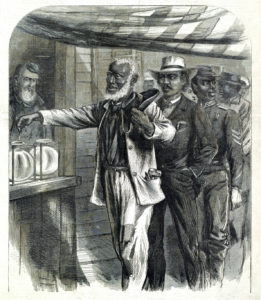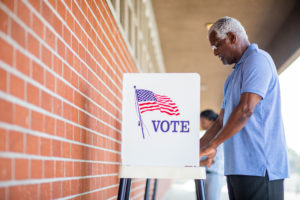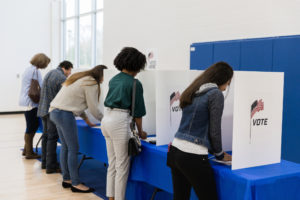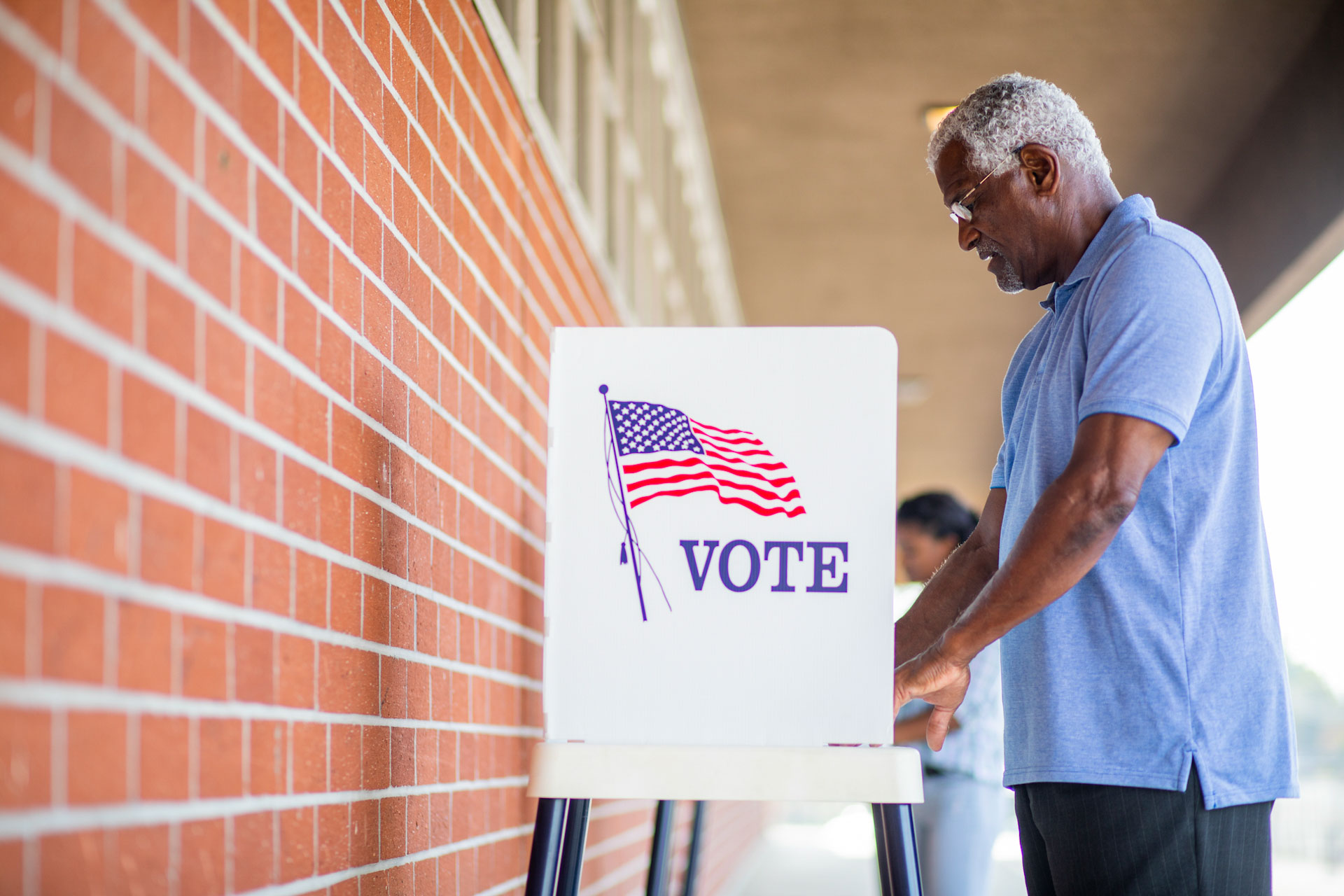By Michelle Betton, Writer
“The vote is the most powerful instrument ever devised by man for breaking down injustice and destroying the terrible walls which imprison men because they are different from other men.” -President Lyndon B. Johnson when he signed the Voting Rights Act of 1965
For communities nationwide, 2020 will be a big year, a year in which the chance at future prosperity will be determined for many. Social justice depends on a web of rights being heeded and respected by all to work in favor of the populace. From the 2020 elections to the census to the Community Reinvestment Act revisions, many events are taking place this year that will shape disinvested communities, particularly communities of color, for years to come.
As an organization concerned with solutions that reverse historical disinvestment, we know that there are many factors in disinvestment that need to be addressed. Equal voting rights is one of them.
Truly being able to thrive requires the ability to fully participate in our democracy and choose leaders who shape their agenda through the prism of racial and social justice. The right to vote is at the heart of our country’s democracy: one person-one vote allows each person to use their voice to shape their experiences and their community. With communities of color and communities with low-to-moderate incomes experiencing significant gaps in equitable access to the benefits that build shared prosperity, the value of voting rights in promoting agency for community members to make decisions about their future becomes all the more evident.
“The Vote is Essential”: A Brief History of Voter Suppression
Martin Luther King, Jr. once said “The basic elements so vital to Negro advancement can only be achieved by seeking redress from government at local, state, and federal levels. To do this, the vote is essential.”
Through the vote, individuals and communities can advocate for the quality of education that they expect for their children (and themselves), demand solutions to gaps in affordable housing and healthy food access, and hold officials accountable for creating policies that benefit the interests of all. Through the vote, each person commands the respect and dignity inherent in their being by making their voice heard.

Vintage illustration featuring Thomas Mundy Peterson, the first African American to vote in an election, following the 15th Amendment to the United States Constitution.
The influence that the vote carries is not taken lightly by people with power. Historically, communities of color, especially Black communities, have experienced various forms of voter suppression. During Reconstruction, Black votes were cast in record numbers. However, as Reconstruction gave way to the Jim Crow era, access to voting for Black Americans dried up, with punitive laws, poll taxes, and pure intimidation keeping people away from voting booths.
This continued into the civil rights era, when Black Americans began pushing against their systematic exclusion from the democratic process. Martin Luther King, Jr., Fannie Lou Hamer, organizations like the Student Non-Violent Coordinating Committee (SNCC), and many more pressured local, state, and federal officials for the right to vote. In 1964, students and activists from across the country went to Mississippi to register Black voters in what was called Freedom Summer. The brutality that they faced shocked the nation, in particular, the disappearance and murder of three young activists, one Black and two White.

The Voting Rights Act of 1965 was a critical turning point in legitimizing voting rights for Black Americans and other people of color.
Martin Luther King, Jr. spoke repeatedly with President Lyndon B. Johnson to pass federal legislation to honor the right of Black citizens to participate in democracy and advocate for themselves. In 1965, Johnson signed the Voting Rights Act into law, giving Black Americans and communities of color explicit coverage under federal law to vote in all elections.
Today’s Voter Suppression Legacy
The legacy of discrimination against Black Americans still impacts individuals and families today, the effects of which can been seen in the disinvestment that many communities of color have lived with for generations. In recent years, instances of voter suppression have expanded. In 2013, the Supreme Court removed a provision that required regions with historical voter discrimination to “pre-clear” changes in their voting procedures with the Department of Justice, and be able to show that they did not have a discriminatory purpose. Jurisdictions across the country have implemented stricter voter laws, many of which result in reduced voter turnout among people of color, older adults, and people with disabilities.

Various states and jurisdictions across the country have found ways to make it more difficult for people of color, older adults, people with disabilities, and people living with criminal records to vote.
Voter suppression was a major theme of the 2018 Georgia gubernatorial race, which saw then Georgia Secretary of State Brian Kemp win over Stacey Abrams. More than half a million names were purged from the voter rolls before the election, and long lines at polling places, election server security breaches, and strict signature-matching rules caused a toll on voting turnout. Further disheartening was the fact that, as Secretary of State, Kemp oversaw the election for the office for which he was running.
In 2019, after Florida voters reinstated the voting rights of individuals living with felony criminal records after they served their time, state officials enacted a law to prevent justice-involved individuals from voting if they could not afford to pay outstanding court fees. This was a burden few could afford. That law has since been overturned by a Circuit Court of Appeals.
In Wisconsin, more than 200,000 voters were purged from the rolls for suspicion of having moved, but without the information being verified.
“Breaking Down Injustice”
“Let us therefore continue our triumphant march to the realization of the American dream.” –Martin Luther King, Jr.
Alongside voting rights, this year, revisions to the Community Reinvestment Act and the census are on the minds of those who live in and support disinvested communities. We have discussed the need for mindful CRA modernizations that center disinvested communities as was intended when the Act was created, not the interests of financial institutions. Read our blog and the statement made by the CEOs of four Community Development Financial Institutions, including our President and CEO Ellis Carr.

A new citizenship question added to the 2020 census could jeopardize representation for immigrant communities.
The addition of a citizenship question to the 2020 census has led to concerns that immigrants will not participate for fear of deportation. That is significant because census data determines how much federal funding jurisdictions receive to support the needs of the local community, and determines how federal districts are drawn. As we have previously written about, immigration has been a vital part of this country’s history, adding vibrancy and community.
Disenfranchisement of immigrants, communities of color, and communities with low incomes weakens our national fabric and polarizes us when we should be united.
As we think about supporting our communities to achieve shared prosperity this Black History Month, social justice-oriented organizations can think about their commitment to stand side-by-side with communities as a way to create a more level platform from which community members can lobby for equity and civil liberties. These issues are not things of the past. They are very real now. When individuals have their basic needs met, they can rise to address other issues that are integral to their full participation.

Mission-oriented individuals and organizations can use this moment to elevate the voices of community to transform structural racism and disinvestment.
Mission-driven organizations can use 2020 as a moment (within a larger movement) to build power and generational wealth with our neighbors and community partners so that disinvested communities have greater opportunities to determine the future that they want for themselves and their families and live up to Martin Luther King, Jr.’s dream.
We will continue to do what we can to support communities in achieving economic justice and financial prosperity. Supporting organizations that champion voting rights for all is something that everyone can do. We ask you to find out more about voting rights and how they impact the communities that you live and work in. Many organizations are working to ensure equitable voting and full participation for all residents. For information on how you can engage around voting rights, visit these websites: American Civil Liberties Union, Southern Poverty Law Center, the League of Women Voters, Florida Rights Restoration Coalition, and Fair Fight.








